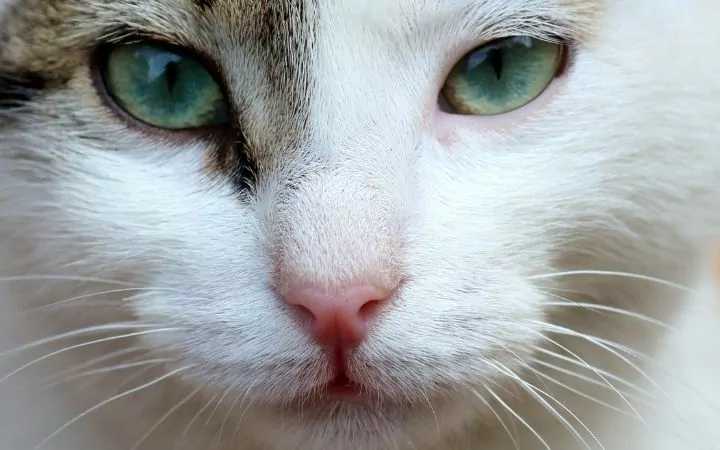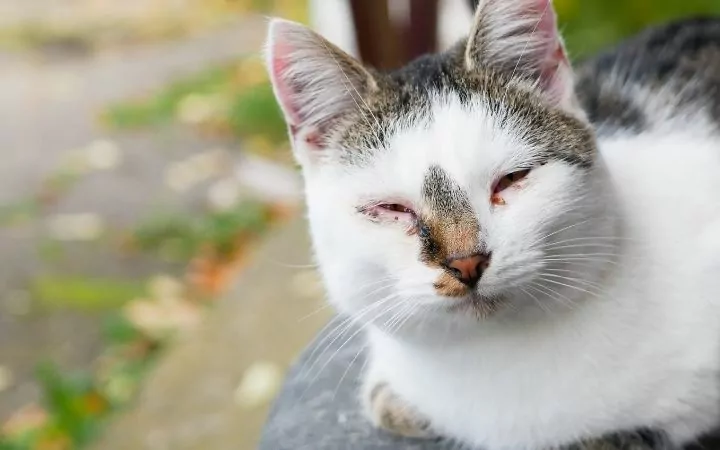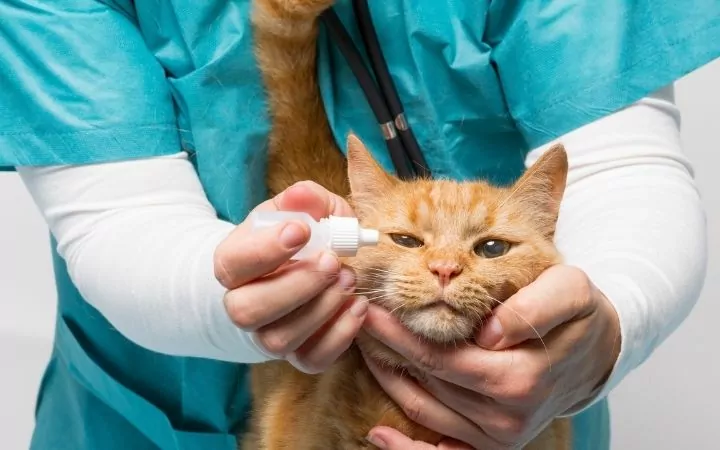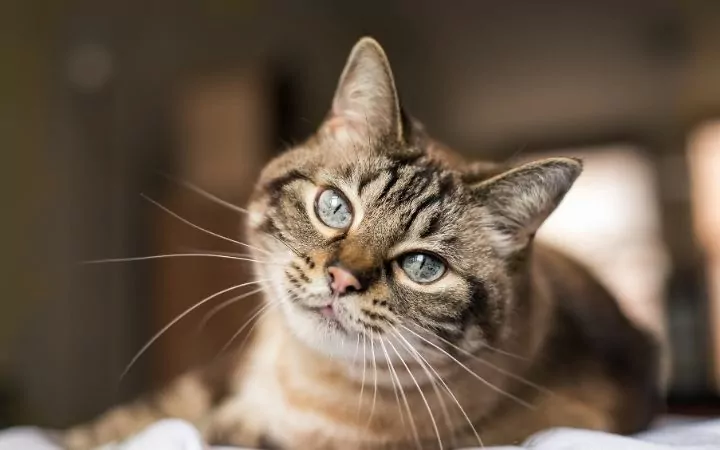Is your cat “crying” these days? Then it might be time for a checkup at your veterinarian! Cats don’t cry because they’re getting emotional. So if you’re now wondering why your cat has watery eyes? You have come to the right place.
Eye Health in Cats
Healthy cats will all have a tear film around the eyes. This film is continually producing tears to keep the eyes from drying out and protecting them. The tear film also dispels any bacteria or other foreign objects from the eye and keeps injuries from worsening.

So if your cat is tearing up more than usual, it is due to physical reasons – not because it watched a romantic movie. Some of these causes are harmless and will disappear by themselves. Others will, like cat conjunctivitis or epiphora, need help from a veterinarian to be handled.
Causes of Watery Eyes in Felines
All cats can get watery eyes. There’s no difference in whether the cat is male or female. However, some cats are predisposed to having watery eyes due to their breeds, like The Persian or the Birman cat.
But even regular cat eyes can get watery eyes. Take a look at some of the most common reasons for cat eyes watering!
Conjunctivitis
Conjunctivitis in cats is also known as cat-eye infection or pink eye. It is one of the most common causes of why cats get watery eyes. Bacteria or viruses cause infection. Sometimes with the bacteria being the primary cause, other times, it is secondary to another issue.
The bacteria that most commonly causes conjunctivitis is Feline Chlamydophilos. Not to be mistaken for the one that sometimes infects humans, they’re just in the same “family” of bacteria. Often cat eye infections can also be secondary to injuries or foreign objects in the eye.

Upper Respiratory Infections
Cat flu is one of the most common diseases in cats and can give your cat watery eyes. It is often caused by either the Feline Calicivirus or Feline Herpesvirus. These can lead to increased discharge from the eyes, which looks like just increased watery eyes. It can also lead to conjunctivitis if not treated soon enough.
Eye Ulcer
Eye ulcers happen due to small injuries to the eye that gets infected. If your cat paws its eye regularly, is squinting and blinking a lot while having watering eyes, it might be signs of an eye ulcer. Often the third eyelid will also be present or even cloudiness of the eye.
Epiphora
Runny eyes that simply occur due to an overflow of tears are called epiphora. This happens when the tear film cannot be adequately drained from the eye. This will almost always be secondary to other conditions like rhinitis (inflammation in the nose) or sinusitis (inflammation of the sinuses).
Especially brachycephalic cat breeds, the ones with round and flat faces, are more likely to be prone to epiphora.

Allergy
Cats like us can be allergic to a lot of different things. Allergies will cause sneezing and itching, but one of the most common symptoms is watering eyes! Often you’ll be able to see that the allergy occurs at the same time of the year or after introducing a new product to the household. Some of the things cats can be allergic to are:
- Dust
- Cleaning products
- Perfumes
- Pollen
- Medication
Effective Treatment for Watery Eyes
When your cat gets watery eyes, it should disappear quickly. If the tearing persists or is excessive, it is recommended to contact your veterinarian to get it diagnosed, especially if other symptoms accompany the watery eyes. Symptoms like:
- Squinting and blinking
- Pawing at the eyes
- Red or swollen eyes
- Yellow or green discharge
- Cloudy eyes
Your vet will look for the underlying cause, check for damages inside, and measure the pressure in the eye. All to help relieve your cats’ discomfort.
The exact treatment depends on what is causing the cat’s eyes to water, of course! But, if your cat is diagnosed with a cat-eye infection, you’ll likely be given some eye drops.

It is unlikely that this will be a great joy to your cat, but it should often relieve the symptoms quite fast and is an essential part of treatment. You can, however, do some things to help your cat get its eye drops.
- Keep it in a calm environment.
- Speak calmly.
- Try not to touch the surface of the eye with the applicator.
If you both stay calm, the cat-eye infection should hopefully disappear soon, without too much fuss!
Preventive Care at Home
The best preventive care you can do is to keep up with your regular vet visits and vaccinations. But, the second best thing is to keep a close watch on your cat at home. Make it a habit to check your cats’ eyes for redness, cloudiness, or excessive watering.
If you know your cat gets watery eyes due to an allergy, there are quite a few treatment options for allergies out there! The first step is, of course, to try and avoid whatever causes the reaction. However, if that’s not an option, hyposensitivity shots or allergy medication might help to keep your cat’s eyes from watering too much!

Summary
No one likes having runny eyes, cats even less than us! Therefore, it is vital to be aware that cats with watery eyes are essential to look out for. Also because, if left untreated, it can cause damage to the vision and even blindness.
Luckily your veterinarian should be able to guide you through what exactly will be the best for you and your cat. So you can both watch romantic movies together – and only one of you gets teary-eyed!
